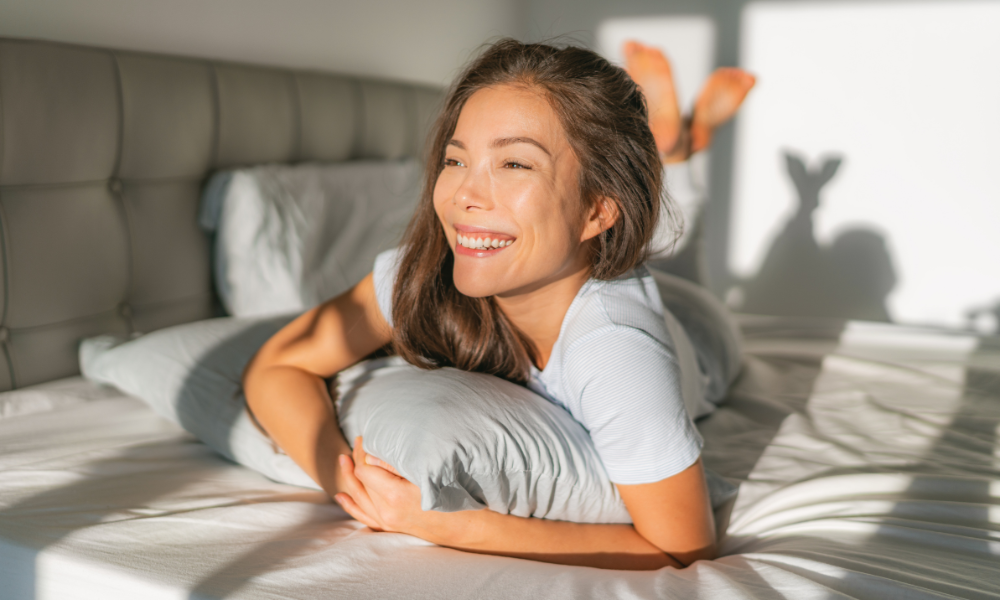Tips for How to Get a Good Night’s Sleep

Getting an adequate amount of sleep has many benefits, including maintaining a healthy weight. Studies have shown hormones affecting our weight can be compromised due to lack of sleep, thus contributing to an ever increasing over-weight society. 😔
There are two hormones at play in our sleep story: ghrelin and leptin. Ghrelin is your body’s hunger hormone and signal you to eat more. Leptin is your satiety hormone which lets your brain know when you’re full so you stop eating.
When you are sleep deprived your leptin levels decrease, while your leptin kicks increase, meaning you’re both sleep deprived and hungry. After a poor night’s sleep you may also notice increased cravings or have a tendency to eat more calories.
So, how do we get our leptin and leptin hormones to work properly with our bodies? Get enough sleep!
Tips for How to Get a Good Night’s Sleep
- Darkness: Make sure your room is completely dark. Any light can hinder the production of a hormone called melatonin that helps you fall and stay asleep. Black-out blinds or simply using night shades over your eyes will make a huge difference in your sleep quality.
- Temperature: Studies show that the optimal room temperature for sleep is quite cool, between 60 to 68 degrees. Keeping your room cooler or hotter can lead to restless sleep. Opening a window slightly in the cooler months is easy. Using a ceiling fan or table fan is also a great way not to get overheated. Breathable bed linens are also very helpful – stick with 100% cotton sheets, wool or down comforters and blankets. For those with long hair covering their nape (back of neck) try pulling your hair up in a pony-tail above your head. The nape area keeps a lot of the heat inside the body, and may contribute to overheating at night.
- Noise: If you have annoying noise keeping you awake like a ticking clock or a tap dripping – fix it. If you live on a busy street where you cannot control the noise – try using ear-plugs. If you sleep with a snoring partner, moving to another room can be very beneficial.
- Wakefulness: For those with hypoglycemia and who wake between 3:00 a.m. and 4:00 a.m., have a protein snack such as a tablespoon of peanut butter or an ounce or two of cheese a couple of hours before bedtime. Do not drink caffeine after 3:00 p.m. and avoid sugar and alcohol after 6:00 p.m.
- Over Stimulation: For those who have trouble falling asleep – no computer use, work you have brought home, or TV. before bed – this is extremely stimulating. Some quiet time prior to sleeping like reading a book, meditation, or a warm (not hot) bath can aid the body to get ready for bed. Journaling, listening to soothing music is also relaxing.
- Create a ritual before bed: Give yourself 30 minutes to prepare yourself before your scheduled sleep time. Brushing your teeth, changing into comfortable night clothes, opening a window, having a glass of water by your bed if you get thirsty, setting your alarm clock, getting your clothes ready for work, etc. Take a few minutes to write down any plans for the next day. Writing them down and then forgetting about them is the best way to fall asleep as opposed to running a “to-do” list through your head before sleep time.
- Comfortable mattress and pillow: If you are sleeping on something uncomfortable, look for a replacement. if you can’t afford a new mattress, sometimes all you may need is to add a topper to a mattress for added softness, or a board under the mattress for more firmness.
- Try sleep supplements. Try supplementing such as melatonin supplements, 5-HTP, Valerian Root, etc. Try and avoid addictive sleep aids.
- Play the right tunes. Turn on a sleep machine that play “white” noise, ocean waves, storms, wind chimes, etc. You can also listen to a meditation podcast or search for sleep sounds on YouTube. Make sure you download anything you listen to. It is important to turn wifi off and put your phone on airplane mode while sleeping to avoid EMF radiation or having your screen light up which will eventually disrupt the cycle of your sleep.
Getting enough sleep will reduce stress, improve your mood, lower inflammation, give you more energy, and is also imperative for the brain to function properly. Learn more on the importance of sleep.
